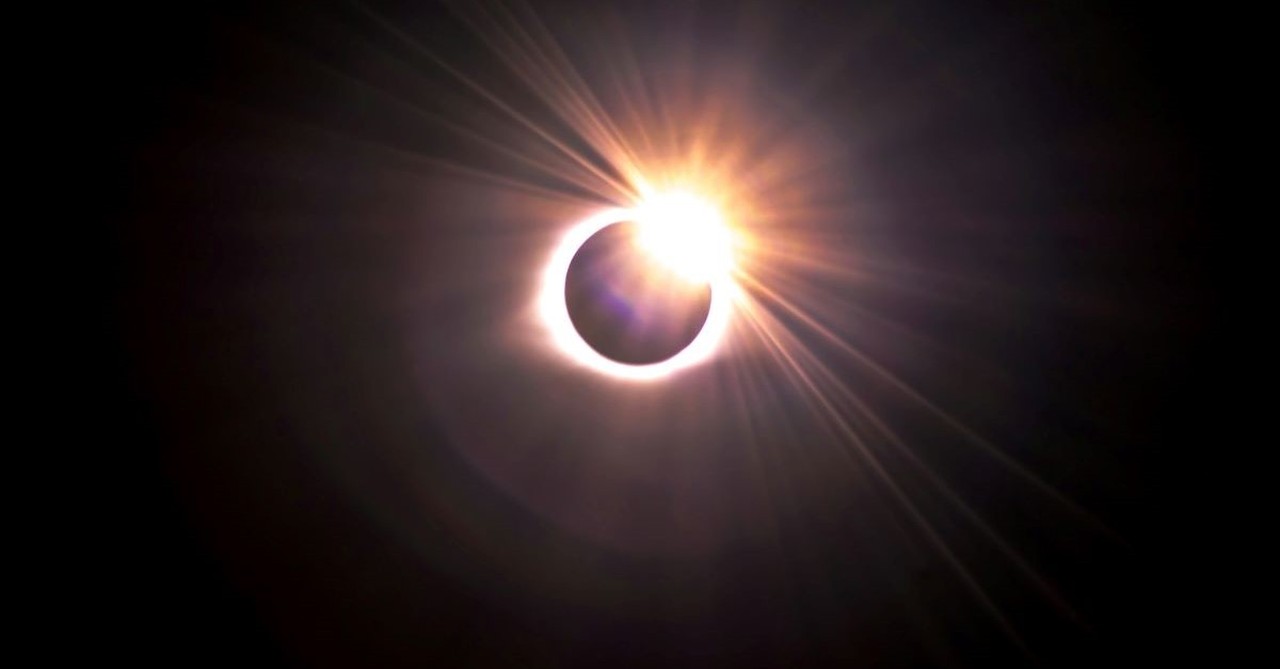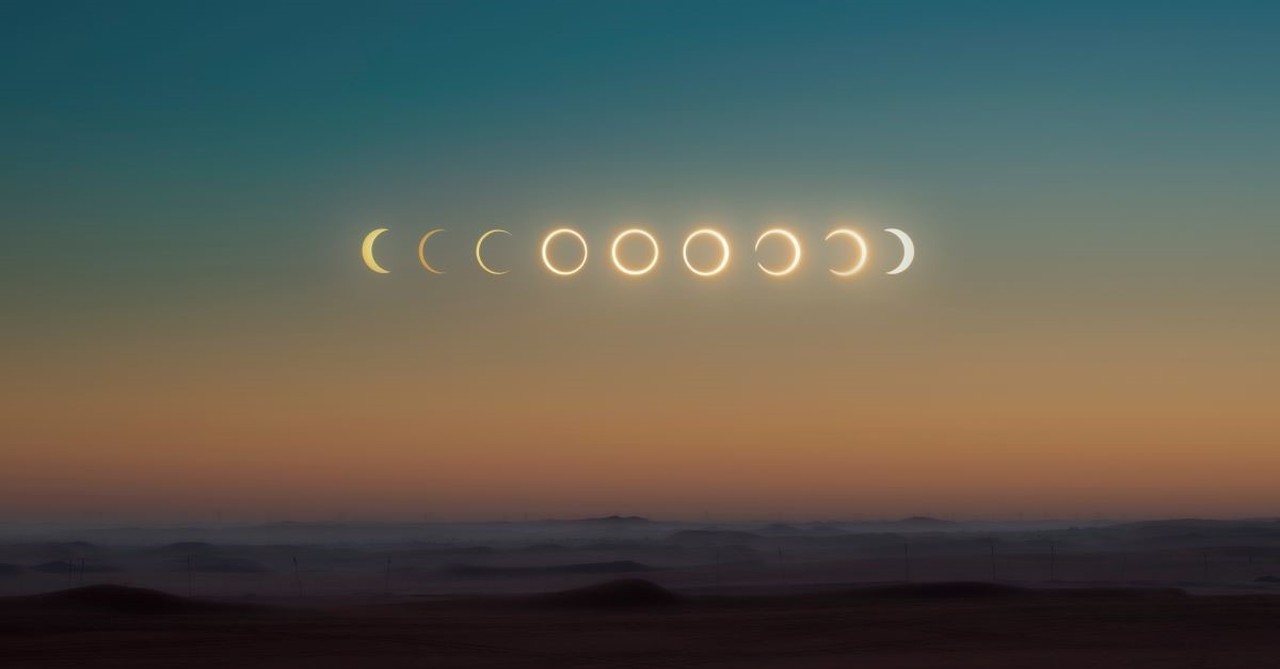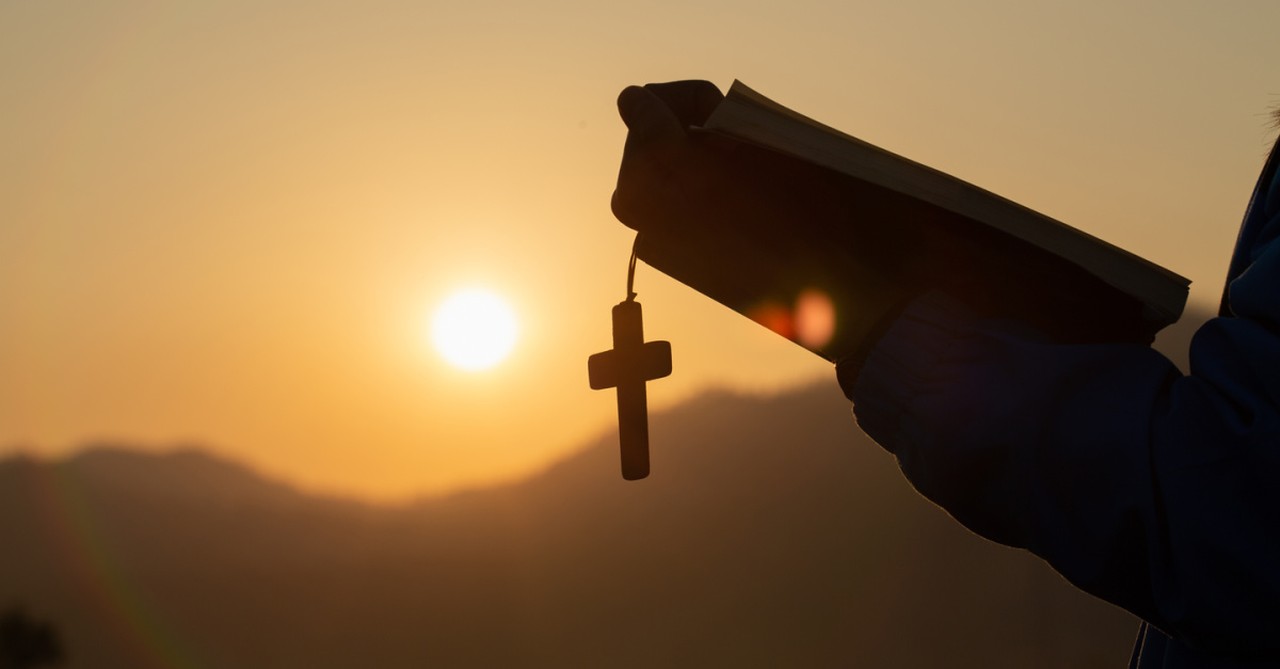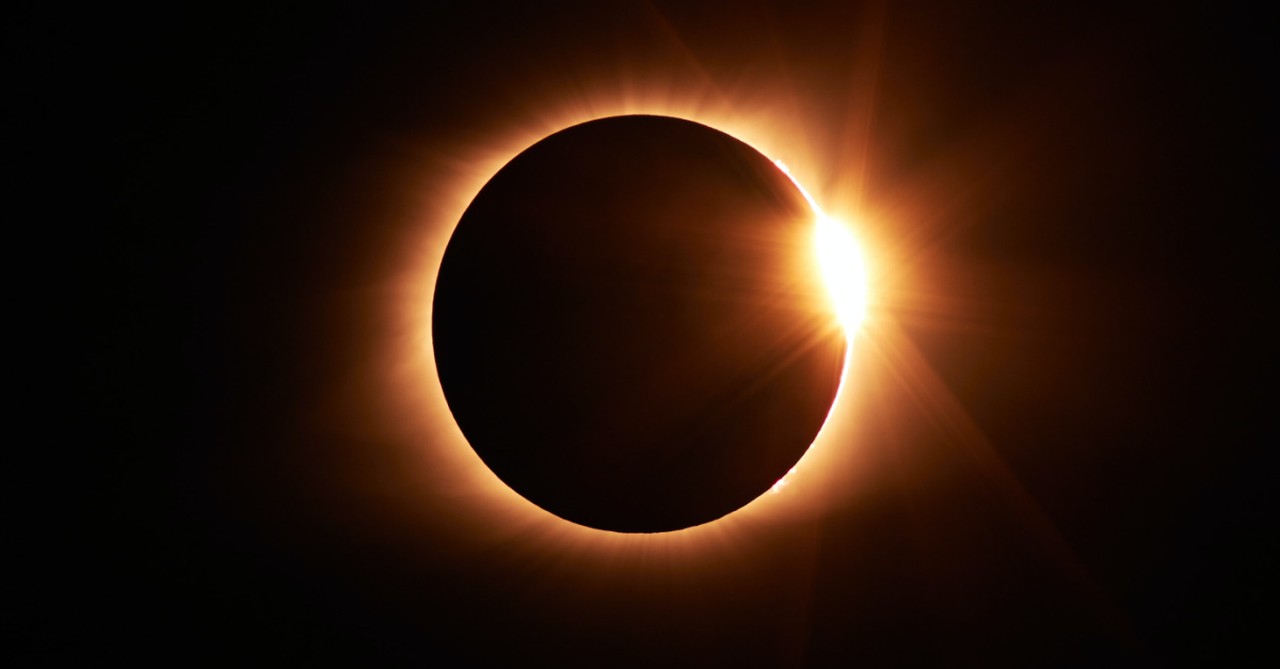
The solar eclipse that will appear in the sky over North America on April 8, 2024, is a special celestial event that many people are anticipating with excitement. As we look up to enjoy the 2024 eclipse, we can look forward to seeing an awe-inspiring display. A dramatic event like an eclipse reflects God’s glorious creative power. The Bible declares in Psalm 19:1, “The heavens declare the glory of God; the skies proclaim the work of his hands.” So, let’s get ready to celebrate God’s wonder on display during the upcoming solar eclipse! We can prepare for the eclipse well by learning what happens during a solar eclipse, understanding its historical and biblical significance, uncovering the spiritual meaning of an eclipse, and more. Here’s what to know about the significance of the upcoming solar eclipse and how to watch it well.
Photo Credit: Unsplash/Justin Dickey
1. What happens during a solar eclipse.

1. What happens during a solar eclipse.
SLIDE 1 OF 5
A solar eclipse occurs when the moon passes between the Earth and the sun, blocking all or part of the sun’s light from reaching Earth. These alignments happen because of the orbits of the Earth, moon, and sun, which periodically align in such a way that the moon’s shadow falls on Earth. Some areas of North America will be in the “path of totality” for the eclipse in April. That means people in those areas will experience a total solar eclipse. In a total solar eclipse, the moon completely covers the sun, casting a shadow on the Earth and plunging areas within the path of totality into darkness. Totality only lasts for a few minutes. But that small amount of time features big dramatic sights.
Observers can witness the sky grow dark as if it’s nighttime during the daytime. When the moon is covering the sun, people can see the sun’s corona (the outer atmosphere of the sun) glowing brightly around the dark silhouette of the moon. Those who are watching the eclipse outside the path of totality will experience a partial solar eclipse, in which the moon covers only a portion of the sun’s disk. They will see a partial shadow on the Earth – depending on their location, which determines the extent of how much the moon covers the sun.
Photo Credit: Unsplash/Abed Ismail
2. The historical significance.

2. The historical significance.
SLIDE 2 OF 5
Throughout human history, solar eclipses have held profound significance for various cultures and civilizations. People have interpreted eclipses in a diverse variety of ways. In many ancient societies, people viewed eclipses as manifestations of spiritual forces of good and evil – eliciting either positive responses like wonder or negative responses like fear. One of the earliest recorded accounts of attempts to predict solar eclipses dates back to the ancient Chinese Shang dynasty, starting with a solar eclipse that happened in 2137 BC. Chinese astronomers meticulously documented celestial events – including eclipses – and associated them with the actions of cosmic beings. Eclipses were seen as omens of change, with their occurrence signaling shifts in political leadership or society’s fortunes.
The ancient Mayan people also kept track of solar eclipses, and they saw eclipses as signs of the struggle between good and evil. In ancient Babylon, the people also kept detailed records of eclipses, which they interpreted as bad omens for rulers. Babylonian astronomers developed sophisticated mathematical models to track the movements of celestial bodies, laying the groundwork for modern astronomy. In ancient Greece, the historian Herodotus reported how the ancient Greeks stopped a battle between the Lydians and the Medes during a solar eclipse because they interpreted it as a sign from the gods.
During medieval times in Europe, people often viewed eclipses as signs of God’s judgment or intervention. They sometimes interpreted the sudden darkness that accompanied a solar eclipse as a warning of impending disaster or a call to repentance. Eclipses continued to captivate the imaginations of scholars, artists, and theologians throughout the Middle Ages and Renaissance. Leonardo da Vinci and Johannes Kepler both studied eclipses, seeking to understand their underlying causes and cosmic significance. Artists like Michelangelo and Raphael incorporated eclipse imagery into their paintings, using celestial events as symbols of God’s power and transcendence.
In more recent history, eclipses have played a crucial role in advancing our understanding of the universe. British astronomer Sir Arthur Eddington famously observed a total solar eclipse in 1919, confirming Albert Einstein's theory of general relativity and revolutionizing our understanding of gravity. Today, eclipses continue to spark curiosity and inspire wonder. While our scientific understanding of eclipses has vastly expanded, their historical significance reminds us of the profound impact these celestial events have had on human culture, spirituality, and scientific inquiry.
Photo Credit: ©GettyImages/Natali Mis
3. The biblical significance.

3. The biblical significance.
SLIDE 3 OF 5
While the Bible does not specifically mention solar eclipses, it contains passages that speak to the significance of celestial phenomena like solar eclipses. The Bible presents phenomena in the sky as manifestations of God’s power and sovereignty over the natural world he has created. In the Old Testament, the book of Genesis describes God’s creation of the heavens and the Earth with order and beauty. Genesis 1:14-18 reports: “And God said, ‘Let there be lights in the vault of the sky to separate the day from the night, and let them serve as signs to mark sacred times, and days and years, and let them be lights in the vault of the sky to give light on the earth.’ And it was so. God made two great lights – the greater light to govern the day and the lesser light to govern the night. He also made the stars. God set them in the vault of the sky to give light on the earth, to govern the day and the night, and to separate light from darkness. And God saw that it was good.” This passage highlights God’s purpose for creating the sun, moon, and stars.
Some Bible scholars point to biblical passages that describe periods of darkness as possible references to solar eclipses. For example, in Amos 8:9, God mentions a day when “I will make the sun go down at noon and darken the earth in broad daylight.” This imagery describes the sudden darkness that accompanies a total solar eclipse. Also, Joel 2:31 says: “The sun will be turned to darkness and the moon to blood before the coming of the great and dreadful day of the LORD.” Some scholars interpret this verse as a prophecy of future apocalyptic events that feature celestial signs before God’s judgment and renewal.
The Gospel accounts of Jesus’ crucifixion describe a period of darkness that enveloped the land, coinciding with our Savior’s death on the cross. Matthew 27:45 reports: “From noon until three in the afternoon darkness came over all the land.” This miraculous sign emphasizes the cosmic significance of Jesus’ sacrifice for humanity’s redemption. So, while the Bible may not provide explicit commentary on solar eclipses, it does feature passages that show us the spiritual significance of celestial events such as eclipses.
Photo Credit: ©Getty Images/Tinnakorn Jorruang
4. Spiritual meaning from God’s wonder on display.

4. Spiritual meaning from God’s wonder on display.
SLIDE 4 OF 5
Solar eclipses make God’s awe-inspiring power evident. They serve as tangible reminders of our Creator’s power, creativity, and sovereignty over the universe. When we witness a solar eclipse, we are witnessing a celestial dance that God has choreographed with meticulous precision. The intricate alignment of the sun, moon, and Earth – and the perfect synchronization of their movements – reflects God’s wise design for creation.
The experience of watching a solar eclipse is humbling. Psalm 8:3-4 asks God: “When I consider your heavens, the work of your fingers, the moon and the stars, which you have set in place, what is mankind that you are mindful of them, human beings that you care for them?” Eclipses remind us of God’s great love for us, even though we are just small parts of the vast universe. As we look up to watch the upcoming solar eclipse, we can discover the wonder of God’s work in a dramatic way. The spectacle of the eclipse can inspire us to marvel at God’s infinite wisdom and creativity, reaffirming our faith in God as the wonderful Creator of the universe.
Witnessing an eclipse can move us to pray and meditate on God’s wonder. As Psalm 145:5 says of God: “They speak of the glorious splendor of your majesty – and I will meditate on your wonderful works.” While we watch the upcoming eclipse, we’ll be filled with awe that can motivate us to move closer to God. An eclipse lasts only a brief time. But the spiritual growth we can experience from moving closer to God afterward will benefit our souls forever.
Photo Credit: Jongsun Lee/Unsplash
5. How to watch a solar eclipse well.

5. How to watch a solar eclipse well.
SLIDE 5 OF 5
Before the day of the eclipse, consult eclipse maps and predictions to determine the best viewing locations and times. Websites like the National Aeronautics and Space Administration (NASA) and NationalEclipse.com provide valuable information about the path of totality, local weather conditions, and recommended viewing spots. Plan your viewing location accordingly to maximize your chances of witnessing this special event. Expect increased traffic and crowds in areas within the path of totality. Consider arriving at your chosen viewing location early to secure a good spot and avoid potential congestion on roads. Allow extra time for travel and be prepared for possible delays due to heavy traffic.
Arrive at your viewing location well in advance of the eclipse to set up your viewing equipment and familiarize yourself with your surroundings. If you plan to photograph or record a video of the eclipse, test your camera settings beforehand and make sure you have an unobstructed view of the sun. Never look directly at the sun without certified solar viewing glasses or other approved solar filters (such as binoculars or telescopes with certified lenses). Regular sunglasses are not sufficient to protect your eyes from harmful solar radiation. Once you’re ready and the event happens, enjoy it fully. Take time to soak in the experience and marvel at the wonder of the eclipse unfolding before you!
As we eagerly anticipate the upcoming solar eclipse, let’s approach it with a sense of reverence that helps us discover God’s wonder. An eclipse puts God’s wise creativity on display in dramatic ways. When we watch the moon cover the sun, we see the wondrous design that our Creator has put in place for the universe. The ultimate significance of an eclipse is that it invites us to seek God more and enjoy closer relationships with him.
RELATED PODCAST: Need a laugh? Tune in to hear Christian stand-up comedian Jonnie W. talk about how he may sleep in his car to see the solar eclipse with his BFF, John Driver, a best-selling author and pastor! Subscribe to Talk About That for more fun, clean, Christian comedy.
Photo Credit: ©iStock/Getty Images Plus/FG Trade

Originally published March 18, 2024.







